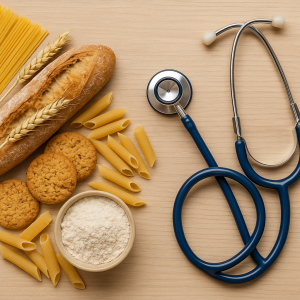Cholesterol is a type of fat (lipid) that is found in the bloodstream and in all the cells of the body
It is an essential component of cell membranes and is necessary for the production of certain hormones, vitamin D, and bile acids that help to digest fat.
Types of cholesterol
Low-density lipoprotein (LDL) cholesterol: This is often referred to as “bad” cholesterol because high levels of LDL cholesterol in the blood can increase the risk of heart disease and stroke. LDL cholesterol can build up in the walls of the arteries, forming plaque that can narrow or block the arteries, leading to a decrease in blood flow to the heart and other parts of the body.
Article continued below
High-density lipoprotein (HDL) cholesterol: This is often referred to as “good” cholesterol because high levels of HDL cholesterol in the blood can help to protect against heart disease and stroke. HDL cholesterol helps to remove LDL cholesterol from the arteries and transport it back to the liver, where it can be broken down and eliminated from the body.
Cholesterol is produced naturally by the liver and is also found in certain foods, such as eggs, meat, and dairy products. It is important to maintain healthy levels of cholesterol in the body, as high levels of LDL cholesterol and low levels of HDL cholesterol can increase the risk of heart disease and stroke.
What are the benefits of cholesterol?
Cholesterol is not always bad. If it doen’t exceed the safe limits, it has benefits.
Some of the benefits of cholesterol include:
Hormone production: Cholesterol is a building block for hormones such as testosterone, estrogen, and progesterone, which are important for growth, development, and reproduction.
Vitamin D production: Cholesterol is converted into vitamin D when the skin is exposed to sunlight, which is necessary for the absorption of calcium and the maintenance of strong bones.
Bile acid production: Cholesterol is a component of bile acids, which are produced by the liver and help to digest fat in the small intestine.
Cell membrane structure: Cholesterol helps to maintain the structure and stability of cell membranes, which are essential for the proper functioning of cells.
Does diet affect cholesterol levels?
Yes, diet can affect cholesterol levels in the body. There are certain types of fats that increase cholesterol levels, while other types of fats can help to lower them.
Saturated fats, which are found in animal products such as meat and dairy products, can increase LDL cholesterol levels. Trans fats, which are found in some processed foods and fried foods, also increase LDL cholesterol and lower HDL cholesterol.
On the other hand, monounsaturated and polyunsaturated fats, which are found in foods such as nuts, seeds, and certain types of oils (such as olive oil and canola oil), help to lower LDL cholesterol and increase HDL cholesterol.
Eating a diet that is rich in fruits, vegetables, whole grains, and lean proteins (such as fish, poultry, and beans) help to maintain healthy cholesterol levels. It is also important to limit the intake of foods that are high in saturated and trans fats, and to choose foods that are low in cholesterol and sodium (salt).
In addition to diet, other factors that can affect cholesterol levels include physical activity, weight, and genetics. It is important to work with a healthcare provider to determine the best approach for managing cholesterol levels.
Do eggs increase the levels of cholesterol?
Eggs are a good source of protein, vitamins, and minerals, but they also contain cholesterol. One large egg contains about 186 mg of cholesterol, which is more than half of the recommended daily intake of 300 mg per day for adults.
Eating eggs can for a few people increase cholesterol levels and for others, not. The effect on cholesterol levels varies from person to person. Some studies have shown that eating eggs can slightly increase LDL cholesterol levels, while other studies have found no significant effect on cholesterol levels, regardless of the quantity of eggs.
The effect of eggs on cholesterol levels may depend on the overall diet and lifestyle of the person consuming them. For example, people who eat a diet that is high in saturated and trans fats and do not get enough physical activity may be more likely to experience an increase in LDL cholesterol levels after consuming eggs.
Just to be safe, it is generally recommended to limit egg consumption to no more than one or two eggs per week. People who have high cholesterol levels or are at risk of heart disease may need to limit their intake of eggs even further. It is always a good idea to talk to a healthcare provider about the appropriate intake of eggs for an individual’s specific health needs and goals.







